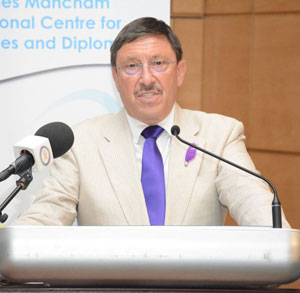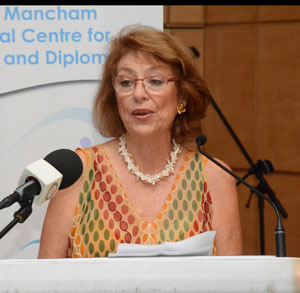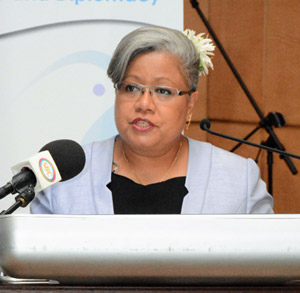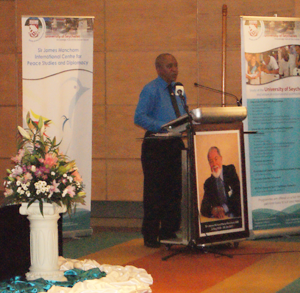Vice President Vincent Meriton,
Excellencies, Ladies and Gentlemen,
It is indeed a privilege and an honor to have this opportunity to address you today on the occasion of the launch of the Sir James Mancham International Centre for Peace Studies and Diplomacy, and I for one, applaud the centre’s aspiration to be a hub for the study of peace and diplomacy, as I believe there is indeed a need to undertake research on topical issues regarding national development processes and to analyse their impact on national unity and reconciliation.
Having said that, I also believe the Centre will be a key contributor in informing our lawmakers, policy makers and implementers, on the issues that need to be considered in the design of laws, policies and programmes that are gender sensitive, not only in word, but in interpretation and application. I say this today, as oftentimes, the implications of engendering laws and policies are taken for granted, and the actual realizable benefits of ensuring that women are active and equal players in peace-keeping, mediation and the socio-political and cultural stage, is lost.
While we are traditionally a matrifocal society, where mothers head families and fathers would appear to play a less important role in the home in many cases, our women still do not have equal representation to our men in the legislative, judiciary and the executive. Sadly, where women have reached the top in many instances, they still somehow require the ultimate approval of a man – be it their spouse, partner or boss.
Nonetheless, and this is quite interesting, a poet by the name of William Ross Wallace, in 1865 was astute enough to recognize that women, particularly mothers, have a decisive influence on the future direction of society, when he wrote the well-known phrase: “the hand that rocks the cradle, is the hand that rules the world”- because women raise and nurture the next generation.
And indeed, women in their various roles of mother, wife, sister, daughter, and friend, tend to approach conflict issues through open communication, honest dialogue and discussions on differences, so as to arrive at a win-win situation to ensure peace and reconciliation rather than seeking victory or retribution. They run families and, by necessity, must be skilled in problem solving. And it is for this reason that we must begin to involve women in peace building and reconciliation, a domain which outside of the family is traditionally male dominated.
Excellencies, Ladies and gentlemen,
Over the last 30 years as a Medical Professional, a Paediatrician, Former Minister and presently, the Seychelles Ambassador for Women and Children, I have had the opportunity to speak to many women - mothers who have shared their daily struggles to work and at the same time care for their children, their spouses, their sick and their mentally and physically challenged loved ones. I have known brave women who despite their personal grief, have fought and are still fighting courageously, to reel in the family fabric despite the odds faced by the conflict brought on by drugs and alcohol abuse, HIV/AIDS, poverty, rebellion, simply because they believe in, and want, a better life for their loved ones.
Perhaps it is innate in women to have the nurturing disposition which calls for caring and dispute resolution through the best means of ensuring that at least some of the concerns of all conflicting parties are met for a peaceful result.
Women’s contribution to peace and reconciliation must not however, be restricted to the home, but rather should be extended to the areas of security, justice, socio-economic initiatives, and decision making organs, policies on gender-based violence, and HIV/AIDS and good governance. It is important to empower our Seychellois women and girls to contribute to national reconciliation and peace-building. But for that to happen, we must take the time to understand fully the potential our women have as well as the daily struggles they have to face and overcome to be equal partners, in the peaceful and harmonious development of our beloved country.
It is in this context that I believe the Sir James Mancham Foundation will be a key partner in promoting and creating awareness of the critical role women have as peacemakers in the family, in the community, at the wider national level, and why not regional and International levels.
Seychelles ratified the The Convention on the Elimination of All Forms of Discrimination against Women (CEDAW), in 1992 and this convention defines discrimination against women as "...any distinction, exclusion or restriction made on the basis of sex which has the effect or purpose of impairing or nullifying the recognition, enjoyment or exercise by women, irrespective of their marital status, on a basis of equality of men and women, of human rights and fundamental freedoms in the political, economic, social, cultural, civil or any other field."
In fact, “Following the Beijing conference in 1995 many non-governmental organizations were born in Seychelles, these included the Seychelles Association of Professional Women (SAWOP); Alliance of Solidarity for the Family (ASFF); Gender and Media Plus (GemPlus); Association For The Promotion of Solid Humane Families (APSHF); Women In Action and Solidarity (WASO) and in 1998, the Seychelles Women’s Commission which was recently renamed Gender Commission.”
However, despite all of this and the guarantee of non-discrimination and equality, provided for in our Constitution, we find our women still facing the challenges of gender-based violence, poor organisational capacity amongst ourselves, limited motivation and facilitation of women initiatives, which at the end of the day limits the contribution of women to the process of peace-building and reconciliation.
I cannot stress enough on the necessity for research and programmes that promote gender equality and women’s empowerment in employment and entrepreneurship; for this is a prerequisite for our sustainable peace and development, as well as for a just and egalitarian society.
Confidence-building is part of this empowerment and allows for the challenging of traditional power structures and provides for leadership in civil society which is a significant role-player in Peace-building. In fact, civil society organisations are best placed to take on this role as key players in the quest for peace, democracy and economic development being less restricted than government institutions in pushing forward causes (such as that of women) and making sure they are on Government’s agenda.
Hence, it is anticipated, that the launch of this important International Centre for Peace Studies and Diplomacy, will open up windows of opportunity for ensuring a more proactive involvement of our women in our own reconciliation process which, I am sure all of us here, consider vital for our country.
Some may disagree with my views but, from where I sit and work, I find our beautiful nation is moving into a state of cultural and moral erosion. Simple courtesies and values that once were held sacred in our society are being washed away daily as families disintegrate and mothers’ traditional role of supporter and nurturer, is being replaced because of the daily struggles making ends meet, fighting addictions, surviving violence and sexual abuse.
The contribution by women to uphold and respect the values and norms of a strong family, which itself is a stepping stone to building a peaceful and a stable society at the macro level, is sadly slipping away. Our women, and especially mothers, more and more are consumed by these challenges, leaving them no time to dedicate to ensuring life values are passed on to their children, and their communities.
As mentioned before, we are a Matrifocal society and not a matriarchal one as many like to call us, because of the high prevalence (51% ) of female-headed households with scarcity of resources coupled with the inability to address basic needs. Therefore, women do not exercise fully, the power to promote peace and reconciliation in their communities let alone in their own home.
We need to re-empower our women.
We need new solutions - new strategies to involve women as equal partners in peace building if it is to be sustainable and if there is to be national unity and reconciliation, good governance, justice and poverty-reduction.
We are most fortunate that our Government is 100% committed to the sustainable development of our country, but we can all do more to help. It has been said before and I will repeat: “reinforcing positive cultural values is the bedrock for building peaceful social capital”.
‘Women have a strong potential for educating their children and imparting on them positive cultural values that enhance peace and reconciliation. Women have the cultural role of being mediators and helpers to those who are in need; in areas where women have come together and worked towards reconciliation, their children have spontaneously followed in their footsteps.
The Government has demonstrated its will to give women the trust and responsibility of nation building by appointing us to all positions of leadership and responsibility in society from the executive, legislative and judicial arms of the government, yet the role in decision-making with regard to conflict prevention and resolution remains male dominated.
Some of us have had the opportunity of having received training in Mediation, Negotiation and Peace-building and I consider myself honoured and privileged to have been one of those women who has had the occasion to study at the DIRCO Diplomatic Academy in South Africa as well as at the Clingendael Institute at The Hague in the Kingdom of the Netherlands. Subsequently, I was nominated by the Seychelles government and was appointed in September 2016, as one of only 2 female members on the ‘Panel of Elders’ within the SADC Mediation, Conflict Prevention and Preventive Diplomacy Structure. However proud I am of this achievement for Seychelles, I have yet to be called to serve - but there is time still.
Those of us, who serve in cabinet, parliament, the judiciary, and other spheres of life, should serve as role models and help to develop confidence amongst women and young girls to step up and assume their equal part in decision making processes, peace and reconciliation.
Our many local women’s associations (such as FAWE, SAWOP, Political women’s caucuses, the Soroptimists, etc.) all serve to bring women from different backgrounds together for the good of their communities and society.
They should be applauded and encouraged to take their associations further in empowering women to lobby together and influence the enacting of laws that protect and promote the rights of women, for example, with regards to the inheritance law, the law on the rights of the child, the rights of women at the place of work, and to sensitise women on the critical role they can and must play in developing and implementing the strategies for national peace and reconciliation.
Of importance to remember is that when women take on an issue that affects them, they more often than not tend to raise other issues that affect not only themselves, but the wider community (be it with regards to housing, security, or cost of living). Women tend to see the bigger picture and hence their involvement in peace building and reconciliation initiatives would surely benefit from this broader perspective when considering the causes of conflict and its daily impact and the solutions that can promote a peaceful society and nation.
In conclusion let me say just that Seychellois women have played key roles throughout the country's contemporary history but we need to ensure women are empowered to step up to the peace-building platform and participate in issues of national reconciliation and peace-building efforts. With the launch of this new Centre, I have high hopes that research and programmes that emanate from within, will be such that promotes and enhances the role of women in this process.
I thank you all for your kind attention.







